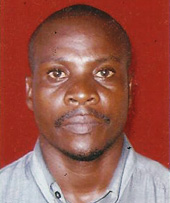A court in Kisumu, western Kenya, recently acquitted journalist Bernard Okebe, at left, of graft charges after a two and a half year case against him. While the case is finally over, Okebe is still dealing with the fallout of being accused of blackmail.
In December 2008, the police chief of Nyamira, a town in western Kenya, accused Okebe of bribing him. Police Chief Lawrence Njoroge alleged that Okebe had demanded 15,000 Kenyan shillings (US$175) to stop him from publishing a damaging article against him.
A reporter with the The People and later The Financial Post, Okebe was following a story about a complaint letter written by a local businessman to the former police commissioner, Hussein Ali. The letter, which Okebe reviewed at the commissioner’s headquarters, alleged that the Nyamira police chief had demanded a 20,000 Kenyan shilling (US$234) bribe from the local businessman to continue his business in Nyamira, Okebe told me.
The Nyamira police chief called Okebe to his office after the reporter phoned him for comment back in December 2008. When he arrived, Okebe alleged something twisted occurred: “Njoroge pointed a gun at me and ordered me to count some money he had spread across his desk,” he said. “Immediately, four police officers arrested me claiming I had attempted to bribe Njoroge with the cash.” The police detained him overnight at the Kisumu police station and was arraigned in Kisumu Court the following day. Okebe was fighting the case ever since.
Local journalists who have followed the case said from the beginning that Njoroge never managed to bring any evidence against Okebe, and that his witnesses often brought conflicting evidence. Principal Magistrate Kimwele Muneeni ruled there was no evidence linking Okebe to soliciting and receiving a bribe, according to local reports.
“This was clearly an abusive prosecution, launched with the sole aim of silencing Bernard Okebe,” said Peter Noorlander from the London-based nongovernmental Media Legal Defense Initiative, which helped with the journalist’s defense. “There was simply no credible evidence against Okebe and the decision to let the case against him go ahead was a clear abuse of prosecutorial power.”
While Okebe is happy the case is over, it certainly took its toll on his professional and personal life. Media houses relinquished employment opportunities after hearing about the court case against him, he told me.
But Okebe could have lost a lot more. In his defense statement, he said he feared for his life after Njoroge pulled a gun on him: Okebe’s late colleague Francis Nyaruri was killed soon after publishing a corruption-related story about the same officer. The January 2009 murder of the Weekly Citizen reporter Nyaruri remains unresolved despite a directive by the attorney general in June 2009 to investigate the potential role of Njoroge and other police officers in the murder, according to CPJ research. Njoroge denied any involvement in Nyaruri’s murder in a 2009 interview with CPJ.
By September 2010, Okebe said strange men started to follow him around his hometown. Fearing for his life and family, Okebe moved out of town and moved his wife and two children to another location.
Another friend and colleague of Nyaruri faced similar threats. Nation contributor Samuel Owida had investigated the Nyaruri murder case and published several stories about it. By December 2010, Owida fled his home after receiving threatening phone calls that he would “share Nyaruri’s fate,” he told me.
Despite the arduous court case and threats against him, Okebe says the victory in court has encouraged him to continue writing and continue advocating for change. “It is challenging to report in western Kenya,” Okebe told me. “Often reporters are forced to change their writing simply to save themselves from the wrath of local politicians and officials. Journalists are simply not able to report freely.”
Nyaruri’s widow, Josephine Nyaruri, is still looking for answers in the gruesome murder of her husband. And Okebe and Owida are still cautious, routinely moving locations separate from their family to ensure their safety. Meanwhile, the former police chief of Nyamira was transferred to Turkana Central, in northwestern Kenya. Although a remote post, he has managed to keep his position despite all of the allegations placed against him.
